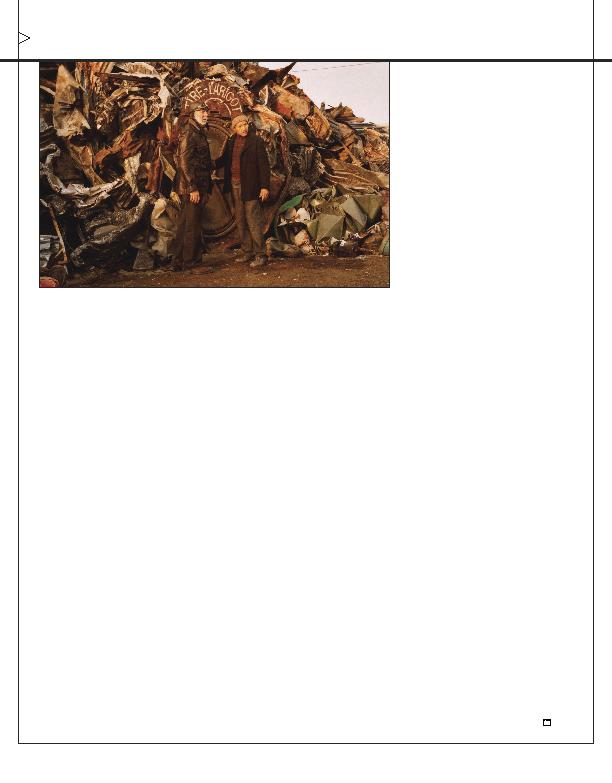
partner, Guillaume Laurant, hinges on a co-
incidence fit for one of the director's films.
"It was a story of destiny," Jeunet explains.
Laurant had written a spec script and was-
n't sure which of the Delicatessen directors
he should send it to, Marc Caro or Jeunet
(at that time, the creative pair still collabo-
rated on all their films).
Jeunet says, so Laurant sent his writing sam-
ple to the latter. The director was tickled by
what he read and called Laurant, only to
reach a rather absurd outgoing voicemail
message. Luckily for Laurant, his sense of
humor piqued Jeunet's curiosity and the di-
rector asked for a meeting.
we work together, we watch TV and laugh
about the same things." Jeunet, who thinks
in almost purely visual terms, was particu-
larly taken with Laurant's gift for dialogue.
He asked the still relatively inexperienced
writer to supply some lines for his next col-
laboration with Caro, The City of Lost Chil-
dren, and when the time came to helm a
solo effort, Jeunet asked Laurant to co-
urally. Laurant writes the text, while Jeunet
supplies the more image-oriented flourishes.
The details themselves come from a
metaphorical "box" -- which is actually an
ever-growing computer file full of inspira-
tions, observations and all-around odd gags
that Jeunet hopes to one day incorporate into
all his films.
very banal way, like everybody, I suppose," Je-
unet says. "In fact, this is the most difficult
part." For Micmacs, the platform is predictably
eccentric: An orphan (Danny Boon) who lost
his father in a landmine accident is nearly
killed during a drive-by shooting, which
leaves him with a bullet lodged in his brain
(an injury inspired by an actual friend of Je-
unet's, who committed a holdup in the '70s,
was shot by police, survived and ultimately
swam the English Channel). Vowing to bring
down the weapons manufacturers responsi-
ble, he enlists half a dozen fringe friends, set-
ting into motion an elaborate series of Rube
Goldberg-style gags -- the more convoluted,
the better.
cards on a big board and attempt to distribute
as many jokes and ideas from their stockpile
among the scenes. According to Jeunet,
"Sometimes we have a small idea for 20 years
and we try to put it in, but it doesn't work."
In Micmacs, for example, he shot a scene in
the Paris subway that involved a gag he's
wanted to do for decades but, alas, the scene
ultimately didn't fit and was cut -- an un-
common 15-minute omission in a process
that is otherwise so tightly written and story-
boarded in advance that Jeunet rarely has to
trim more than a minute from his films. "I
won't tell you the idea, because we might use
it again one day," he teases.
undermine the film's raison d'être. "We use
whatever is best for the story," he says. With
Micmacs, the central concept was driven by
three creative impulses: First, tell the story of
a weapons dealer. "It's been on my mind for
a long time," he says, "not to give a message,
not to make a political movie, but just to be
able to speak about these strange people.
They are very nice guys. They love technol-
ogy, but they completely forget what it is de-
signed for -- to kill and destroy."
Story. "For [Micmacs], the idea was to make a
slapstick story or a live cartoon," Jeunet says.
"In real life, characters are very complicated
psychologically. In my film, they are exactly
like the Seven Dwarves," -- an oddball en-
semble in which each is defined by a single
trait, à la Happy, Grumpy, Sleepy and so on.
Leone (Once Upon a Time in the West). Jeunet
previously dedicated many months to the
process of adapting Yann Martel's fantasy ad-
venture novel "Life of Pi," but couldn't
muster the budget to see his vision to the
screen (Ang Lee took over the project), and so
Micmacs offered Jeunet a chance to clean the
pipes and indulge in all sorts of crazy ideas
while telling a relatively simple story.
at the end of writing a scene, I don't have a
smile on my face, I think it's not enough, I
have to rewrite it the day after. I am like a
chef. After I prepare a good dish, I test it. I
need to find something funny for me and
then I want to share it with others."